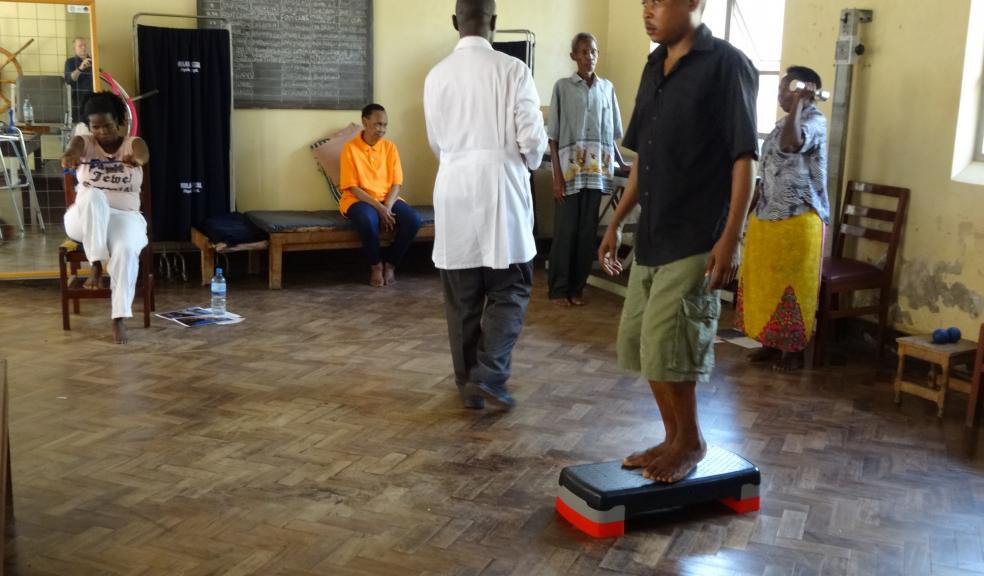
EU funding to support chronic lung disease research
Researchers from Plymouth University Peninsula Schools of Medicine and Dentistry are part of an international consortium which has received funding of almost €3 million from the EU Horizon 2020 programme, to investigate methods to prevent, diagnose and treat non-communicable lung disease (such as asthma and chronic pulmonary obstructive disorder – COPD) in low and middle income countries.
The programme of study, called FRESH AIR, is a continuation of projects carried out by the team from Plymouth University in Uganda, and will operate in Uganda, Vietnam, the Kyrgyz Republic and Greece.
Researchers from Plymouth University will use the experience gained from projects involving pulmonary rehabilitation clinics and smoking cessation programmes which they established in Uganda, and which use innovative means to achieve awareness and success, such as involving local midwives. This project is the latest step for Plymouth in an ongoing story which started with a small project in Uganda and which has subsequently grown, attracting interest and funding from organisations such as the Medical Research Council.
The Plymouth University team has a number of roles within the consortium, including training healthcare workers in spirometry and testing new smart phone spirometry. The team will also adapt ‘very brief advice’ smoking cessation training and provide training for healthcare workers in pulmonary rehabilitation. The innovative midwife involvement scheme will also be used.
The team from Plymouth University is led by Dr. Rupert Jones. He said: “Chronic lung disease caused by tobacco use or household air pollution is a silent killer in low and middle income countries. It has impact on quality of life and on local economies – a population literally struggling for breath is in consequence unproductive. The fundamental truth of the matter is that in most cases not only is chronic lung disease avoidable in these countries, by implementing awareness campaigns and health programmes such as pulmonary rehabilitation clinics the quality of life for those with lung disease can be greatly improved – to the benefit of their health, their communities and the health care budgets of their nations.”
He added: “FRESH AIR is an immensely exciting project which builds on work we have carried out in Uganda. The project has the potential to make a real difference in countries of need, which is why we are grateful to the EU Horizon 2020 programme for its support.”
FRESH AIR will adapt and test innovative ways to implement evidence-based practice in the prevention, diagnosis and treatment of chronic lung disease. Uganda, Vietnam, the Kyrgyz Republic and Greece have been chosen for the study because they have high levels of tobacco consumption and exposure to household air pollution (from open fires used for cooking and heating).
In Uganda almost 40 per cent of adults aged between 30 and 39 have COPD, while in Vietnam 56 per cent of adult males smoke. In the Kyrgyz Republic 47 per cent of men smoke, while Greece has the highest rate of tobacco use in the EU at 38 per cent of the population – smoking also accounted for almost 200,000 hospital admissions in 2011 with associated treatment costs of €554 million, or more than 10 per cent of the national hospital budget.
The FRESH AIR study will consider a number of issues, such as: possible methods to address the situation in each country; awareness-raising campaigns; smoking cessation support; COPD diagnosis using innovative spirometry (breath force tests); pulmonary rehabilitation programmes; the effect of smoking and household air pollution on children, and; to generate ways and means to introduce health improvement programmes.
The project will last for three years, at the end of which its findings will be published and methods identified for use not only in the four study countries, but in other nations around the world.
FRESH AIR is led by the Leiden University Medical Centre. As well as input from Plymouth University Peninsula Schools of Medicine and Dentistry the consortium also consists of the International Primary Care Respiratory Group, Makerere University College of Health Sciences (Uganda), the Ministry of Health of the Kyrgyz Republic, Ho Chi Minh University of Medicine and Pharmacy, the University of Crete, the European Lung Foundation, the University of Washington, the UK National Centre for Smoking Cessation and Training, the University of Groningen, the University of Copenhagen and the European COPD Coalition.











